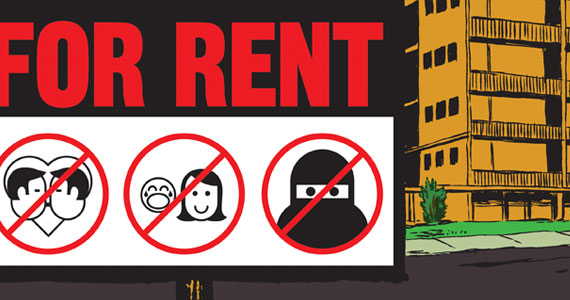A 25-year-old communications professional from Gujarat, Quadri rented a three-bedroom apartment at Sanghvi Heights in Wadala, in the central part of the city. But just a week after she moved in with two other young women, she was asked to move out because of her religion. Her realtor told her that the building society did not allow flats to be rented out to Muslims.
A lot of times brokers never showed me flats. But this time I was told I to leave the house within a week because I am Muslim: Misbah Quadri
— ANI (@ANI_news) May 27, 2015“He [the realtor] threatened to call the cops and throw me out of the flat,” Quadri told The Hindu. “It got very ugly.” Appealing to the builder’s representative didn’t help either as she was told that it was a “company policy” not to have Muslim tenants.
Quadri, who has been in Mumbai for more than five years, is familiar with the pervasive communal bias in the city’s real-estate universe. She lost her patience this time because her two Hindu roommates, who vacated the flat in solidarity, arealso back hunting for a house.
Not the 1st time I faced this issue, I've been in Mumbai for 5 & a half years. Sometimes brokers didnt even show me houses: Misbah Quadri
— ANI (@ANI_news) May 27, 2015The episode comes only a week after a Muslim candidate from Mumbai was denied a job by a Gujarat-based jewellery company because of his religion. “We regret to inform you that we hire only non-Muslim candidates,” he was told in an email.
Not alone in this
When Quadri was asked to leave on a short deadline, she put up her furniture for sale on Facebook. This alerted others to the situation she was in and soon, in an organic reaction, many people began sharing their experiences of facing prejudice in different parts of the country.

Before long, a Facebook group called Indians against Housing Discrimination got created and within days 1,000 members joined in. Many of those active on the group narrate their brushes with bias, while others seek advice on the possible legal recourse that could be taken.


One such member is Sonia D’Costa, a freelance writer who likes to move cities every few months. Her peripateticism came to a halt in Chennai.

“When I started looking for houses, brokers were eager to get me fixed up with a place,” she said. “Once the deal was finalised, we said we will be back to complete formalities. The owner however, called us later and asked if we are Christians.”
Things went downhill from there. “Unfortunately, I was at that time and I said yes,” she recounted. “He immediately said sorry we can’t rent our house to Christians. Just like that. This same thing repeated itself twice before I decided to give up and move somewhere else.”
There are many more such tales on the group. Another member remembered how a realtor turned down his friend, saying “nobody gives houses to Muslims”. Yet another user posted an ad pamphlet he found stuck on a tree in his neighbourhood listing a two-bedroom flat for “Brahmins only”.

The “Brahmins only” ad had also surfaced two years ago, resulting in much outrage on social media, but the practice has clearly not stopped.
Last year, another builder had made headlines for initiating Muslim-only apartments in Greater Noida. On offer were a mosque, a madrassa and amenities dedicated exclusively to the community.
Legal position
Many recognise this trend for what it is: ghettoisation of communities that undermines the ideas of inclusiveness and fraternity. However, in the eye of the law, it’s not so black and white.
In 2005, the Supreme Court missed an opportunity to fix the loose interpretation of the Maharashtra and Gujarat Co-operative Societies Acts of 1962, which many societies use to cultivate ethnic, cultural or linguistic homogeneity.
The case related to the Zoroastrian Co-operative Housing Society Limited. When a Parsi owner of a bungalow wanted to sell the plot to developers, he was challenged because society bylaw didn’t allow selling or renting plots to non-Parsis. The owner went to court but lost the case. As a report in Scroll.in said last year:
“The court emphasised a particular group’s right to preserve its culture, but failed to balance this by acknowledging that such attempts at preservation also led to acts of prejudice. Further, the court ruled that because a society was a private body, it was exempt from having to honour constitutional tenets.”
This hasn’t discouraged Quadri’s lawyer from approaching the Minorities Commission seeking action. Meanwhile, Meana Seshu, a social activist from Maharashtra, has approached Quadri to help her file a complaint with the National Human Rights Commission.
“I have offered help to draft complaint and approach the commission but she is yet to receive her dues so I have been asked to hold off,” Seshu said. “They [the society] cannot have such a policy. If they are a registered society they have to follow government rules of non-discrimination. I feel this should be treated as a human rights violation.”










